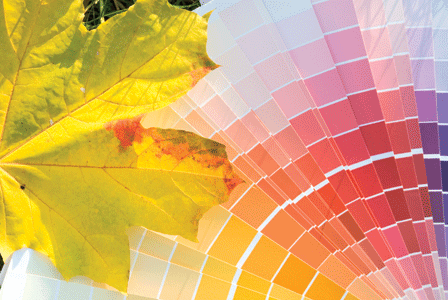
When carrying out a home renovation project, choose eco friendly products to ensure a green renovation from driveway to roof.
With the arrival of warmer weather, eager homeowners are buffing up their exteriors. But are these creative facelifts pleasing to our planet? Give yourself the green light to proceed with these eco-friendly products that will not only wow the neighbours, but will make Mother Earth happy, too.
Pondering paints
For homes that just need a boost, a fresh coat of paint or stain may do the trick. But which product will be best suited and safest?
Low-VOC paints
To be clean and green, check the paint’s level of VOCs (volatile organic compounds), harmful agents that affect our health and the ozone layer. Fortunately, fresh-air outdoor projects are less problematic than indoor jobs and most exterior products are considered eco-friendly if they don’t contain heavy metals or toxins.
All the bigwigs offer product lines with low, or no, VOCs:
- Benjamin Moore: Natura
- Cloverdale Paint: EcoLogic
- Home Depot: Behr’s Ultra
Au naturel paints
Eliminate chemicals altogether. With ingredients such as citrus peel, essential oils, and beeswax, you may even start salivating with these organic paint brands that are all derived from earthy elements:
- Bioshield
- Safecoat
- Ecos
Wood stains
Timber Pro Coatings is a grand-daddy in the business when it comes to earth-friendly wood finishes. Their stains, made primarily from plant-based oils, have been going strong since 1996. Many other eco-friendly stains exist (made from natural oils or water-based)—check your local paint store to explore the different options.
Debating deck re-dos
Oli-Natura Yacht & Teak Oil
This brand really embraces the eco-conscious philosophy. Don’t let its nautical name fool you—if it can resist saltwater wave action, just think what this low-VOC product will do for your deck, patio, veranda, and garden furniture. westwindhardwood.com
TextureStone
Made by the green building materials company, Ecolink, TextureStone has a negative carbon footprint and is a great choice for patios. This nonslip spray stone system has no VOCs; is weather resistant, breathable, and safe; and can be applied on almost any surface. ecolinkgroup.com
Trex Transcend
For both deck and railing, this engineered wood-grained looking product won’t rot, warp, crack, or splinter and is a breeze to maintain. Ninety-five percent of the decking is from recycled content, and all railings come from reclaimed wood.
Built on green principles, Trex saves approximately 600 million pounds of scrap from landfills each year and recycles approximately 1.5 billion plastic grocery bags. trex.com
Re-thinking roof renos
Enviroshake
For those who like the look of shakes but want higher performance, UV protection, and eco-preservation this composite may fit the bill. A blend of post-industrial plastics, recycled rubber, and cellulose, it is primarily manufactured from reclaimed and reused material. It resists mold and mildew, doesn’t require pre-installation treatment, and can be laid without cutting down a tree. enviroshake.com
EcoStar
This brand is a favourite for those with steep pitches. Both their cedar shake and sleek slate designs are dependable and eco-savvy, and they come with a 110 mile per hour wind warranty—so even when Mother Nature gets testy, this topper hangs in there. ecostar.carlisle.com
Distinctions
For thicker roofing material, check out this composite slate. From its curb appeal, you’d never guess it weighs half of what asphalt shingles do. And it barely tips the scale in comparison to quarried slate, even though it replicates it to a tee. roofingstore.ca
Deciding on siding
Considering re-siding your home? Gone are the days of plain aluminum in a few bland colours. Depending on how thick your wallet is, you can envelop your home in anything from stone veneer to seamless steel. But how earth-loving are these materials? Even though most are long lasting and recyclable, unfortunately, they aren’t the most eco-friendly.
To help weed out the most harmful, here are a few questions to ponder before purchasing.
- Where did the raw materials come from?
- Was the manufacturing process polluting?
- Can the siding be recycled when it’s ready for the bone yard?
Like roofing, the greenest siding is generally the longest lasting.
Eco-friendly
- Aluminum siding, though it does require a lot of energy to produce, it holds up well, is usually made from recycled material, and is easily recyclable.
- Salvaged, locally produced brick or stone is durable and almost maintenance free.
- Synthetic stucco can help save energy by increasing your home’s insulation and is also resilient.
Not so eco-friendly
- Vinyl produces hazardous pollutants when manufactured and disposed.
- Engineered wood is less durable than the real thing and will need more frequent replacement.
Dealing with Driveways
Recent studies show that toxic dust particles from coal-tar type driveway sealants are making their way indoors. How can this be prevented?
If you can\’t live without that shiny surface, switch to an asphalt-based sealer, as it contains nearly a thousand times less toxic polycyclic aromatic hydrocarbons (PAHs).
If it\’s time to replace that burdensome blacktop, there are other options:
- green-friendly gravel
- permeable pavers
- EcoGrid, a plastic, sustainable grid that can be easily installed, is engineered to support your vehicle, and when filled with grass or gravel, promotes safer runoff. Even your groundwater will be grateful. terrafirmsolutions.com



